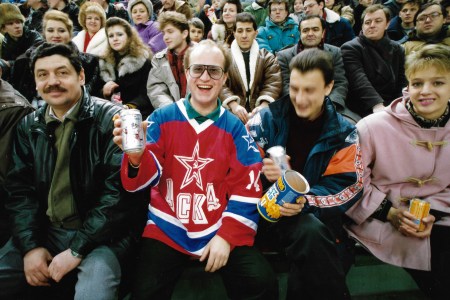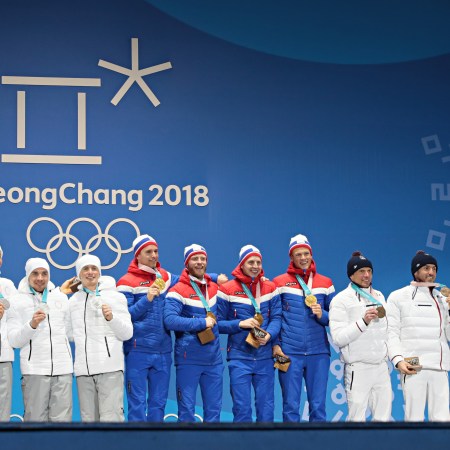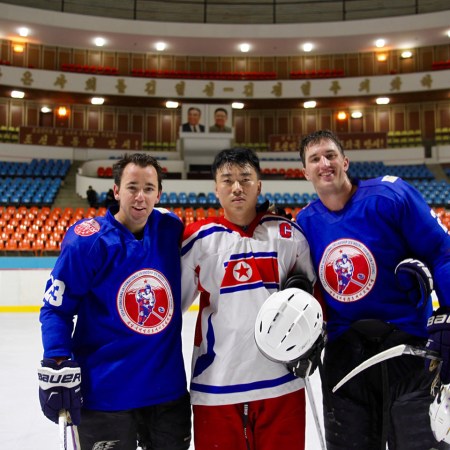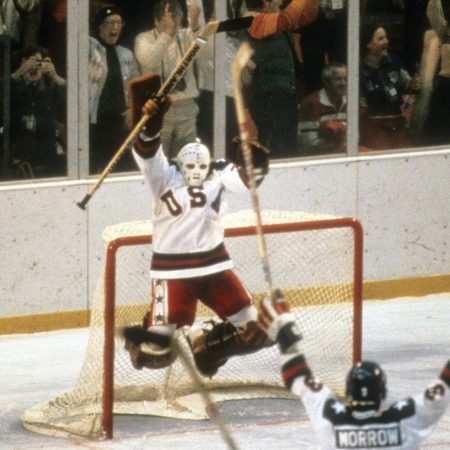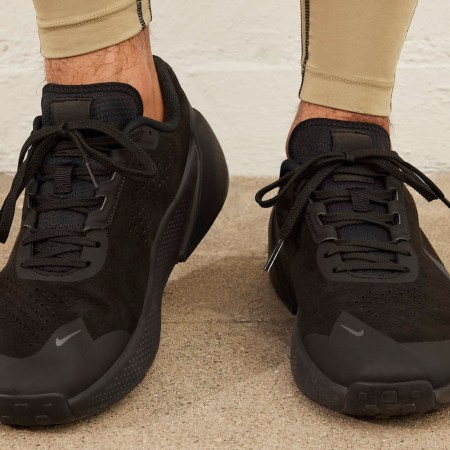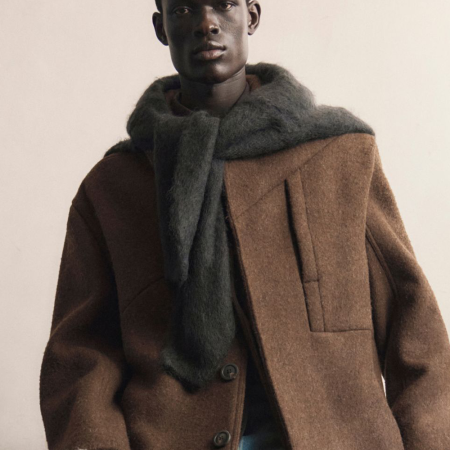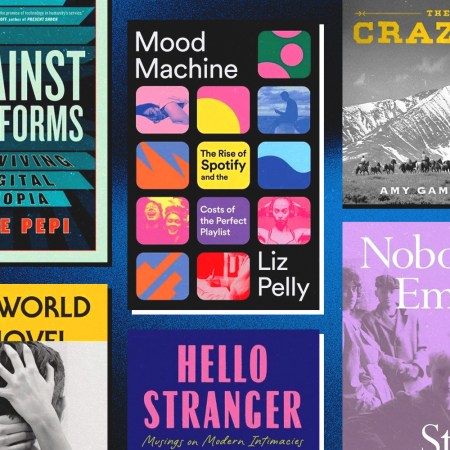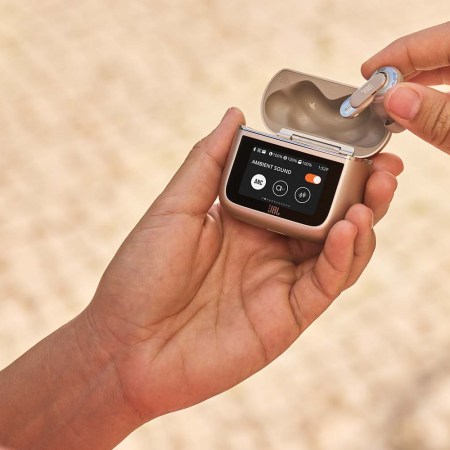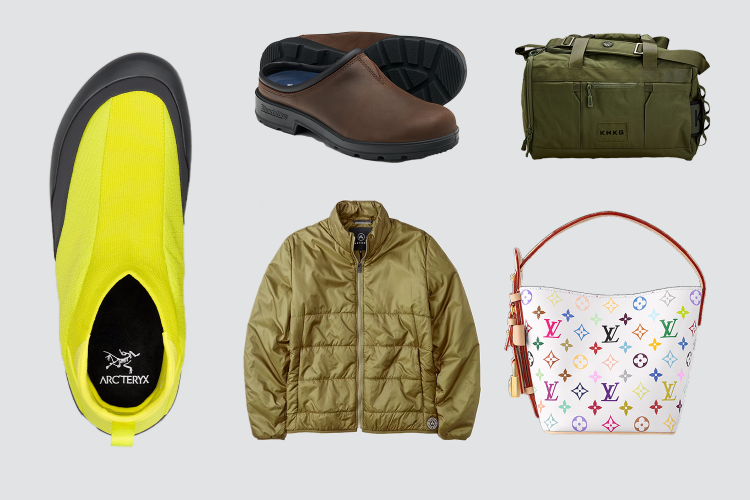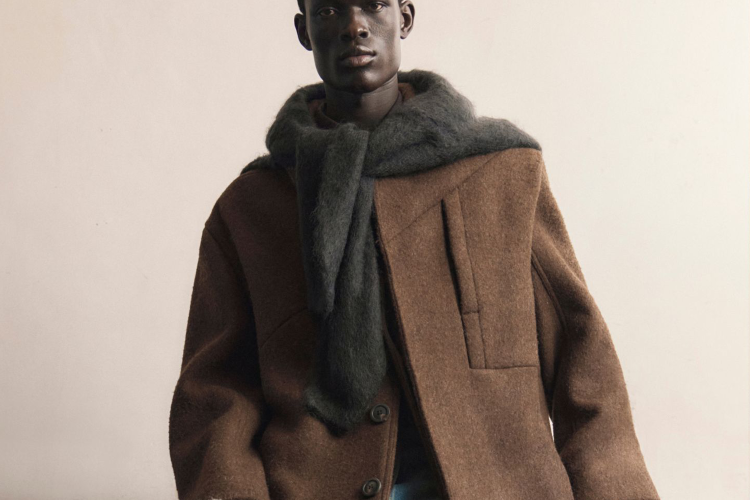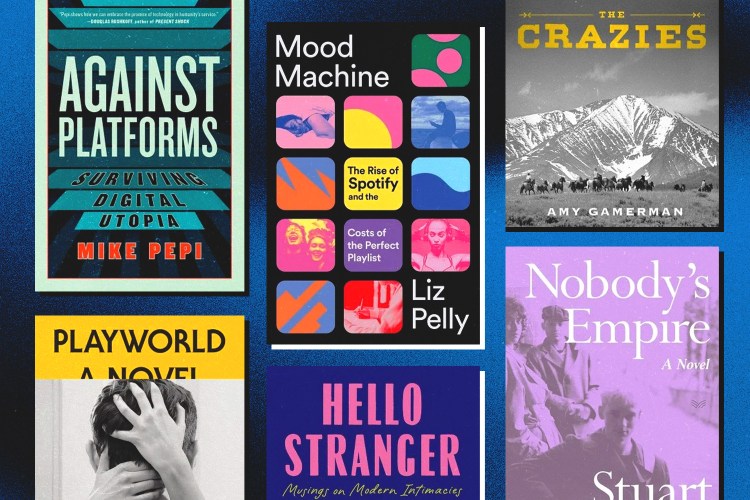The Miracle on Ice — when the United States defeated the Soviet Union in ice hockey at the 1980 Winter Olympics — was one of the Cold War’s most memorable examples of a geopolitical conflict playing out in the realm of sports. It wasn’t the only time such an event took place, however. In his new book, Freedom to Win: A Cold War Story of the Courageous Hockey Team That Fought the Soviets for the Soul of Their People — And Olympic Gold, Ethan Scheiner wrote about the Czech players who helped put their country on the athletic map — and served as kind of resistance to the influence of the Soviet Union.
What follows is an excerpt from Freedom to Win. Here to set the stage is Scheiner, with some useful information to put this excerpt in context: “In the late 1980s, the people of the small East European country Czechoslovakia were obsessed with hockey. They were also ruled by an oppressive Communist Party that was fixated on maintaining order. The Party even went so far as to make an example of young hockey stars who ran afoul of the regime. When the sister of teen hockey player Bobby Holík defected to the West in 1986, the Party punished the boy, removing him from a junior national team. Seeing such cruel and arbitrary rule, countless young people, including thousands of hockey players, grew up in 1970s and 80s Czechoslovakia hating their regime and the Soviet Union, the superpower that provided the support that kept Czechoslovakia’s Communist rulers in power.”
Read on for a look back into ice hockey’s history — and a moment when it converged with international tension.
With a dream of playing in the NHL and the maniacal training methods of his father both driving him, Bobby Holik rapidly improved, but he was hardly Czechoslovakia’s only teenage hockey star. Four other boys his age formed the basis of a junior hockey powerhouse in the little town of Litvínov.
Although just sixty miles northwest of Prague, Litvínov, population 20,000, appeared to be in the middle of nowhere. A trip by train from the country’s capital could take over two hours to reach the town, which sat just eight miles southeast of the East German border. Along the route, a number of the stops appeared to be little more than wilderness. The surrounding region included beautiful villages and small farms, but also swathes of undeveloped land.
Coming by tram, it was hard to miss the local Chemopetrol plant’s giant ceramic vase-shaped smokestacks, which looked terrifyingly like America’s Three Mile Island nuclear plant. Throughout the 1970s and 1980s, Czechoslovakia’s central government had built up state-owned plants in the area, working to ensure an ample supply of petrochemical factories, oil refineries, and coal mines, often over the complaints of local officials and residents who suffered from the effects. At times during the winter, the plant’s emissions, along with those of a neighboring power station’s sulfur, created a cloud layer that left a thick haze in the sky over Litvínov. The plant dominated not just the region’s environment but also the community itself. It was understood that the city would not meddle with the company, especially with respect to its emissions.
That Time Some Americans Bought an Iconic Russian Hockey Team and Failed Spectacularly
Even Gorbachev look-a-like contests, free beer and strippers couldn’t save themIn exchange, Chemopetrol offered ample jobs to locals, built apartment buildings for its workers, and provided them with subsidized meals. It also did something that meant just as much to the people of Litvínov. It sponsored the town’s beloved hockey team, whose official name was the “Physical Education Union of the Litvínov Chemical Plant.”
Since 1959, Litvínov had been the smallest town to consistently maintain a team in Czechoslovakia’s top hockey league, but thanks to a steady stream of talented young players, it kept up with the big boys. With little else to do and nowhere else to go, hockey was central to town life, but love of the hockey team became all-consuming in the 1970s. Born one day apart from each other in late January 1950, Ivan Hlinka and Jiří Bubla transformed the sport in Litvínov. A charismatic, big center forward, Hlinka could seemingly score at will. Bubla was a brilliant defenseman who also was among the top passers in the country. Both joined the team in the late 1960s, and at points in the 1970s raised Litvínov to the league’s top tier. Both men served as stars on the national team, and Hlinka was voted the country’s top player in 1978.
With them, life in Litvínov became hockey, hockey, and more hockey. Residents kept their noses down, performed their jobs, and then looked forward to the two or three days a week that they could watch the sport. Nearly a quarter of the town’s population crammed itself into the local stadium for every game.
The locker room sat so close to the crowd that the players could smell the famous sausages sold in the arena. Inspired by the energy radiating from Hlinka, an amazing team spirit engulfed both the town and the team. Across the country, people couldn’t miss the way that hockey seemed different in Litvínov. Litvínov players showed no stress but instead exuded joy on the ice. They seemed to play simply for the love of the game. In years to come, coaches of Czechoslovakia’s national team exhorted their men to play like they were from Litvínov.
The town became a hatchery for hockey players, and the world took notice. When Czechoslovakia began to allow some of its players who were past their prime to play for a period in the NHL, the first to go, in 1981, were Hlinka and Bubla. The two instantly made a mark as contributors to the Vancouver Canucks team, which made the Stanley Cup finals (the NHL championship). From then on, as NHL teams looked to convince more young Czechoslovak players to come west, Litvínov players were often their target. Beginning in 1983, NHL scouts and executives went wild over the play of Petr Svoboda, a young Litvínov defenseman. Following his final game in the European junior championship tournament, held in West Germany in April 1984, the eighteen-year-old Petr showered in his team’s locker room. After drying off, Svoboda defected to the West, carrying nothing but the clothes on his back. Less than two months later, the Montreal Canadiens made him the fifth player picked in the NHL draft. Because of their son’s actions, Svoboda’s parents were fired from their jobs and left unemployed for two and a half years.
Throughout the 1980s, one of Czechoslovakia’s greatest players was Litvínov’s Vladimír Růžička, another big — six-foot, three-inch, over 210 pounds — center forward, whom the NHL’s Toronto Maple Leafs drafted in 1982, when he was nineteen years old. The Communist authorities kept a close eye on Růžička, ensuring that he remained in Czechoslovakia, where he regularly led the country’s top league in scoring.
However, Litvínov had never seen as great a collection of teens as emerged in the town in the 1980s. The new core was made up of four boys — Robert Lang, Robert Reichel, Martin Ručinský, and Jiří Šlégr — who had all been born within six months of Bobby Holík’s January 1, 1971 delivery. As kids, the four became inseparable. They played together. They attended school together. In the winter, they skied together. In the summer, they rafted together. They got into trouble together in all the innocent ways that young kids do.
They also played hockey in a way that no one else in the country could. In a sport where it was unusual for a single team to score in the double digits, the Litvínov boys sometimes defeated their opponents by twenty goals. It was more than skill. Litvínovans insisted that it wasn’t just a hockey team. It was a lifestyle! An attacking, go-for-the-goal, joyful lifestyle! They flew around the ice with an aura of fun that seemed utterly impossible for players like the intense Bobby Holík. Everyone watching Litvínov play wanted to have that kind of fun on the ice, too! The junior Dukla Jihlava team often played Litvínov, and Bobby looked with envy at the creative flair and genuine ebullience of the Litvínov boys. Bobby daydreamed about what it would be like to play like that and then realized that, if he did play with them, the Litvínov boys would mock his do-or-die approach to hockey and tell him to chill out.
The Litvínov kids played with a lightness unlike anyone else in the country, but they also saw darkness. The 1968 Soviet invasion had been a wake-up call to their families that they would always be under someone’s thumb. The years that followed were a constant reminder. In private, the Litvínov boys’ parents complained about how corrupt and all-controlling the regime was, but even in their little town they feared informants. When the boys spoke disparagingly at home about the Communists, their parents reprimanded them. “Don’t say that outside of the house!” People were far more open, though, with their feelings about the Soviets and the fact that everyone still burned over the 1968 invasion. Even as little kids, the boys all knew about the 1969 games in Stockholm where their heroes stuck it to the Soviet team. The Litvínov boys yearned to exact a similar form of revenge.
Excerpted from Freedom to Win: A Cold War Story of the Courageous Hockey Team That Fought the Soviets for the Soul of Their People—And Olympic Gold, by Ethan Scheiner. Published by Pegasus Books, July 2023.
Whether you’re looking to get into shape, or just get out of a funk, The Charge has got you covered. Sign up for our new wellness newsletter today.

